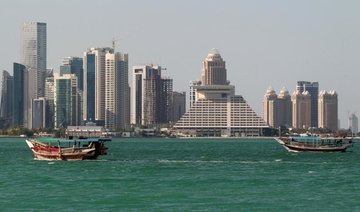WASHINGTON: The United States and Qatar on Tuesday inked a deal to resolve a years-old quarrel over alleged airline subsidies, as Qatar’s government works to defuse tensions with the Trump administration.
A formal announcement came Tuesday, as Secretary of State Rex Tillerson and Defense Secretary Jim Mattis hosted the inaugural round of the US-Qatar strategic dialogue. Agreements, on security and counter-terrorism cooperation and combatting human trafficking, were also signed.
“Qatar is a strong partner and long-time friend of the United States,” Tillerson said, welcoming the agreements. Tuesday’s meeting follows harsh criticism of Qatar from President Donald Trump. He denounced the country last year for allegedly funding terrorism amid a row between the country and other members of the Gulf Cooperation Council, who have imposed a land, sea and air blockade on it.
Qatar hopes to change that narrative by enhancing counterterrorism cooperation and allowing greater US visibility into its finances and banking practices.
Tillerson and Mattis said the US remains deeply concerned about the situation as it nears its eight-month mark, including hostile “rhetoric and propaganda” being employed. They called on all parties to the dispute to renew efforts to end it.
Qatar is home to a major US military base that is key to the fight against Daesh in Iraq and Syria and Mattis said that “a united GCC bolsters our effectiveness on many fronts.”
The aviation agreement will see state-owned Qatar Airways agree voluntarily to open up its accounting books. US airlines say the company receives billions of dollars in government payments that leave them at a competitive disadvantage. Qatar also made a loose commitment that the flag carrier won’t launch flights to the United States from Europe or other non-Qatari cities, creating yet more competition for the US airlines.
Both sides of the dispute can claim the agreement as a victory — for very different reasons.
The US airline industry can claim the increased transparency will create a powerful disincentive to unfair subsidies, as Qatar will no longer be able to mask such payments through creative accounting. The three major US carriers — Delta Air Lines, American Airlines and United Airlines — have spent huge sums over the last three years pressing the Obama administration and Trump administration for tough action. They’re eager to show a win.
Yet for Qatar, the agreement averts the more serious step US airlines wanted: re-opening the so-called open-skies treaties that could lead to less favorable conditions for Arabian Gulf airlines. And, it means that Qatar can also show it’s cooperating closely and productively with US regulators.
That could help the tiny gas-rich kingdom draw a contrast with the United Arab Emirates, whose two airlines are also accused of improper subsidies but have yet to reach an agreement with Washington.
“Everybody gets to claim victory in this,” said Helane Becker, an airline analyst for Cowen and Co.
Indeed, even before the announcement, American, the world’s biggest airline by passenger traffic, praised the deal as a way to “thoughtfully address” Qatari subsidies. And United CEO Oscar Munoz applauded the agreement while thanking Trump’s administration for “effectively representing the interests of the American aviation industry.”
In an eight-paragraph document laying out “understandings” between Qatar and the US, the Gulf nation commited within one year to releasing audited financial statements for Qatar Airlines “in accordance with internationally-recognized accounting standards.” Within two years, Qatar Airways is to disclose any transactions with other state-owned entities, such as caterers or other companies that support airline operations.
A side-letter to the agreement stated that Qatar’s civilian aviation authority is unaware of any plans by Qatar Airlines to start so-called “Fifth Freedoms” flights — routes from third countries to the United States. Under the scenario US airlines fear, Qatar Airways could offer flights from its Doha hub to, say, Paris or London, stop to pick up more passengers, then fly on to New York.
The side-letter only says there are no current plans to operate such service. That’s short of a binding guarantee. There’s also no commitment Qatar Airways won’t expand its offering of Qatar-US flights.
“This appears to be the administration essentially throwing a meatless bone to the three US carriers to put an end to their rants against the Gulf carriers,” said John Byerly, who was the chief open skies negotiator in the Obama administration and has also consulted for Emirates Airline and UPS.
The two UAE airlines — Dubai-based Emirates and Abu Dhabi-based Etihad Airways — aren’t a party to the US-Qatar agreement. Emirates Airline currently offers “Fifth Freedom” flights in which passengers can fly from New York-area airports to Milan, Italy or Athens without ever setting foot in the UAE.
All three Gulf airlines have long denied receiving unfair government subsidies. There was no immediate reaction from either Emirates or Etihad.
US, Qatar reach agreement on subsidy spat with airlines
US, Qatar reach agreement on subsidy spat with airlines

UAE president, Qatar emir review regional developments in Abu Dhabi

- Leaders discussed efforts to address the latest developments in the Middle East
LONDON: The president of the UAE and the emir of Qatar discussed bilateral ties during a meeting at Qasr Al-Shati in Abu Dhabi on Sunday.
Sheikh Mohamed bin Zayed Al-Nahyan and Sheikh Tamim bin Hamad Al-Thani discussed regional and international issues of mutual interest, focusing particularly on the latest developments in the Middle East and sharing insights on efforts to address them.
The leaders explored ways to boost cooperation for the benefit and prosperity of both nations, the Emirates News Agency reported.
Several senior officials and ministers attended the meeting, including Sheikh Tahnoon bin Zayed Al-Nahyan, deputy ruler of Abu Dhabi and national security adviser, and Qatari Prime Minister and Foreign Minister Sheikh Mohammed bin Abdulrahman bin Jassim Al-Thani.
Gaza rescuers say Israeli strikes kill 16, including 3 children

- Israel resumed its military offensive in Gaza on March 18 after a two-month truce in its war against Hamas
GAZA: Gaza’s civil defense agency on Sunday said Israeli strikes on the Palestinian territory killed 16 people, including at least three children.
Six people were killed in overnight air strikes in Khan Yunis governorate, in the south of the Gaza Strip, civil defense spokesman Mahmud Bassal said. They included two boys aged five and two, in an apartment in Al-Mawasi.
The civil defense later said 10 more people were killed in a strike on a tent also in Al-Mawasi, among them a child and seven women.
The Israeli military did not immediately respond for comment when contact by AFP. A spokesperson said they were gathering details.
A military statement issued in the morning said the army had “struck more than 100 terrorist targets throughout the Gaza Strip” during the past two days.
It said soldiers found “weapons caches” and killed “a number of terrorists” in the south.
Israel resumed its military offensive in Gaza on March 18 after a two-month truce in its war against Hamas, which was triggered by the Palestinian militant group’s October 7, 2023 attack.
The health ministry in Hamas-run Gaza on Sunday said at least 2,436 people have been killed since Israel resumed its campaign in Gaza, bringing the war’s overall death toll to 52,535.
Israel halted aid deliveries to Gaza, saying Hamas had diverted supplies. Israel says the blockade is meant to pressure the militants into releasing hostages held in the Palestinian territory.
UN agencies have urged Israel to lift restrictions, saying Gazans have been experiencing a humanitarian catastrophe and warning of famine.
Lebanon holds local polls in first vote since Israel-Hezbollah war

BEIRUT: Lebanon on Sunday began the first stage of long-delayed municipal elections, the first vote since a devastating war between Israel and Hezbollah and after a new national government was formed.
Polls opened at 7:00 am (0400 GMT) for voters in the Mount Lebanon district, a heavily populated area with mixed political and religious affiliations that includes Beirut’s southern suburbs, a Hezbollah stronghold that was heavily damaged by Israeli strikes.
“We have come to exercise our right and have our voices heard,” said Hashem Shamas, 39, a Hezbollah supporter, after voting in south Beirut’s Shiyah neighborhood.
According to the interior ministry, 9,321 candidates including 1,179 women are running in the Mount Lebanon district.
Lebanon is supposed to hold municipal elections every six years, but cash-strapped authorities last held a local ballot in 2016.
President Joseph Aoun emphasized the vote’s importance to “give confidence to the people and internationally that Lebanon is rebuilding its institutions and is back on the right track.”
Aoun was elected in January and Prime Minister Nawaf Salam formed a government the following month, ending a more than two-year vacuum as Lebanon’s balance of power shifted following the Israel-Hezbollah war.
The new authorities have promised reforms in order to gain the trust of the international community, as well as unlock billions in bail-out funds amid a five-year economic crisis. They have also vowed a state monopoly on bearing arms.
Hezbollah was left badly weakened in more than a year of hostilities with Israel, with a slew of commanders including the group’s longtime chief, Hassan Nasrallah, killed and its strongholds pummelled in the south and east and in south Beirut.
Israel has continued to strike targets in Lebanon despite a ceasefire and still has troops in five areas it considers “strategic.”
In April 2024, the municipal polls were postponed amid the hostilities, which escalated in September into a major Israeli bombing campaign and ground incursion before the ceasefire about two months later.
Aoun urged voters not to let sectarian, “partisan or financial factors” impact their vote.
Religious and political affiliations are usually key electoral considerations in multi-confessional Lebanon, where power is shared along sectarian lines.
Municipal ballots however provide a greater margin for local community dynamics to play a role.
Polls are set to close at 7:00 p.m. on Sunday.
Areas of northern Lebanon will vote on May 11, with Beirut and the country’s eastern Bekaa Valley area set to go to the polls on May 18, while voters in the heavily damaged south will cast ballots on May 24.
Lebanese army says Hamas hands over rocket fire suspect

- Israel’s military has continued to strike Lebanon despite a November ceasefire that sought to end more than a year of hostilities with Hezbollah
BEIRUT: Lebanon’s army said Sunday Hamas had handed over a Palestinian suspected of involvement in rocket fire at Israel, days after authorities warned the militant group against harming the country’s security.
Hamas handed over the man “at the entrance to Ain Al-Helweh,” an army statement said, referring to a restive Palestinian refugee camp on the outskirts of the southern city of Sidon.
“He is suspected of involvement in two rocket launches toward” Israel from Lebanon on March 22 and 28, the statement said.
Israel responded to the rocket fire by bombing south Lebanon and Beirut’s southern suburbs, where Hamas ally Hezbollah holds sway.
Israel’s military has continued to strike Lebanon despite a November ceasefire that sought to end more than a year of hostilities with Hezbollah, including two months of all-out war.
The Israeli military often says it has targeted Hezbollah operatives or infrastructure, but also occasionally Hamas members or other allies.
Sunday’s army statement said the suspect’s handover came based on the “recommendation of the Higher Defense Council and the Lebanese government decision on warning against the use of Lebanese territory to carry out any action that threatens Lebanese national security.”
The council issued the recommendation on Friday, warning that “the utmost measures” would be taken to stop any action that violates Lebanese sovereignty.
Last month, the army arrested several Lebanese and Palestinian individuals accused of involvement in the March launches.
A Lebanese security source told AFP at the time three Hamas members had been arrested.
No group claimed responsibility for the rocket launches, and Hezbollah denied any involvement.
UAE to lift Lebanon travel ban on May 7

- UAE will lift a ban for its citizens traveling to Lebanon as of May 7, 2025
DUBAI: The UAE Foreign Ministry announced Sunday that it will lift a ban on its citizens traveling to Lebanon as of May 7, 2025, following a visit by the Lebanese head of state last week, according to WAM News Agency.
The decision comes after a joint statement issued on Thursday, announcing that Lebanese President Joseph Aoun and UAE President Sheikh Mohamed bin Zayed agreed to implement measures to facilitate travel and improve movement between the two countries.
The UAE banned its citizens from traveling to Lebanon in 2021. Lebanese citizens were not banned from traveling to the UAE.


















